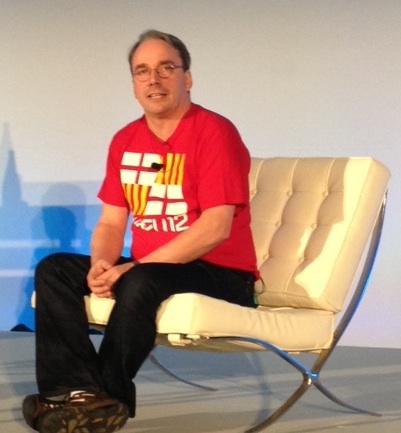 When Linus Torvalds sits down for a chat, people listen. And at Torvald’s keynote presentation Wednesday morning during LinuxCon Europe, the standing-room-only crowd proved just how much star power the Linux kingpin has. Accompanied by long-time collaborator and pal Dirk Hohndel, Torvalds fielded chummy questions from his friend as well as lively challenges from the audience. Here are a few of the highlights.
When Linus Torvalds sits down for a chat, people listen. And at Torvald’s keynote presentation Wednesday morning during LinuxCon Europe, the standing-room-only crowd proved just how much star power the Linux kingpin has. Accompanied by long-time collaborator and pal Dirk Hohndel, Torvalds fielded chummy questions from his friend as well as lively challenges from the audience. Here are a few of the highlights.
Hohndel: Linux is at drinking age now; it’s 21 years old. Everyone wants to know what’s next, but before we go there, what has been your favorite highlight of the last 20 years?
Torvalds: The biggest highlight is the thing I didn’t expect. Twenty years ago, I sat in a dark room alone. I was a single person working on a small project on my own. These days, what makes Linux so much fun is the discussion, the community, the arguments. It keeps us interested, motivated, and always discussing how things can be done better.
Hondhel: That’s an insider answer. What has been your biggest impact outside this community?
Torvalds: It’s not about what I achieved, but what we achieved. It’s about what Linux has allowed others to do. Think about the One Laptop Per Child project. There are so many people doing things with Linux to improve the world.
Audience: What worries you about future?
Torvalds: I’m an optimist. I’m not really worried about future, and I don’t worry about the technical side of the kernel at all. The things that make me stay up at night are usually around difficult personal relationships. The kernel people like arguing. And while being heated is not necessarily bad, sometimes our personalities clash … a lot. Then there are the legal situations. The patent system is just broken, and bogus copyright laws are very irritating.
Audience: The kernel is always changing. What can you tell companies that want to use Linux, but are struggling to keep up with all the changes?
Torvalds: Hardware companies like to use Linux in the embedded world, but they come from a model where you do development for 1-5 years and then leave it unchanged from 5-15 years. Some embedded companies want us to use this same development model. But we can’t say that we won’t change the kernel, because we need to stay stable internally. I don’t think our model is going to change much.
Hohndel: The ability to make changes is one of the major strengths of Linux. We do our development upstream. Embedded hardware companies should try a little harder to work upstream. It’s an advantage. It’s a way to innovate and create interesting products.
Audience: The kernel keeps getting larger and larger. Is there some procedure to get rid of the things that don’t work and that no one uses anymore?
Torvalds: We do remove code occasionally, but only if it has major problems. We have two architectures that haven’t worked for two years, but there’s a reason why we haven’t removed them. There’s always somebody, some random person, who will step up and fix parts that don’t work. It’s fun to see. There’s no cost for maintaining code that no one uses and that doesn’t work, so it’s better to just leave it be in case someone wants to come in and maintain it.
Audience: What about the Google Android situation?
Torvalds: The Android “situation” is no different than the Red Hat or SUSE “situation” 10 years ago. A lot of vendors end up doing their own forks. Google said they needed to make these changes, and we just decided that the Android thing was working for Google. There was a lot of discussion and bad blood about this. People tried to convince Google to change they way they do things. But this is how development happens. Companies come up with new usage models, and it tells us that we need to change. Google has one hundred million devices running their code. They must be doing something right.
Audience: The kernel maintainers are getting older. What about your efforts to recruit younger people?
Torvalds: We are, by admission, 20 years older than we used to be. At the same time, we have all kinds of young people coming in all the time, even high-schoolers. But because the kernel is so important for so many companies, we also get a lot more established professionals whose job it is to do kernel development work.
Hohndel: I know you won’t give us a 5-year outlook about where we’re going, but what about the next 6 months?
Torvalds: We have things coming up. There’s been a lot of discussion about ARM 64 but most of it has been about the name, not the code. In the end, my will prevailed, and it will be named ARM 64. As for kernel releases, they aren’t based on features, but instead on the 3-month release window. So I don’t need to plan ahead. We get it all ready, and whenever it’s ready it gets merged. Really, we don’t have a lot of plans, but everyone seems happy.


